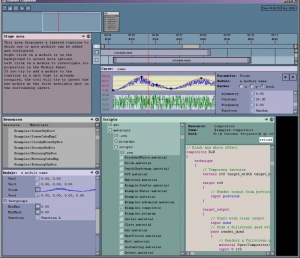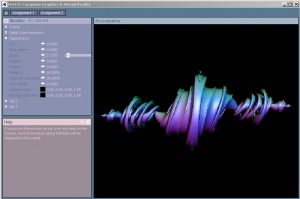Difference between revisions of "Assessment and rehabilitation of cognitive skills using virtual reality"
(→Involved Members) |
|||
| Line 26: | Line 26: | ||
== Involved Members == | == Involved Members == | ||
| + | *[[User:Panics|Sacha Panic]] | ||
Revision as of 12:08, 21 July 2009
This is the homepage of the masters thesis project of Sacha Panic. The thesis focuses on the assessment and rehabilitation of cognitive skills, by using a virtual training environment and a virtual assistant which administers the training.
Project description
Although not widely used yet, virtual reality (VR) has been shown to have useful applications in health care. For example, the Delft University of Technology and the University of Amsterdam have successfully used VR to treat phobias as part of their joint VRET project. The assessment and rehabilitation of cognitive skills is another area where VR shows potential. Some cognitive impairments appear to be shared among conditions such as Alzheimer’s and Parkinson’s disease, or dementia.I have developed a thesis and research proposal which would investigate this use of VR. The research would be partially conducted at the Sensory Motor Systems Lab at the ETH in Zurich in coordination with the head of the lab, Prof. Riener. The Sensory Motor Systems Lab has experience in using VR in clinical rehabilitation, and this cooperation would allow me to conduct a clinical trial as part of my master's thesis work.
The research is centered around the creation of a virtual environment which can be used in the clinical staging assessment of an Alzheimer's patient, as well as in support of the rehabilitation of the patient's cognitive skills. The research will investigate how effective the VR-based cognitive performance training is when compared to a conventional paper-based method. The thesis work will be guided by the following research questions:
- How effective is the use of VR-based training when compared to a conventional paper-based method?
- Does the support of a clinician or a virtual assistant influence the effectiveness of the treatment?
The cognitive performance of the participants will be measured using a standard methodology such as the mental rotation task. The participants will be divided into several groups. In some groups, the participants will be given paper-based training by a clinician. In other groups, the participants will receive a VR-based training which is administered by a virtual assistant that is recognizably similar to the clinician. Soliciting user engagement, motivation and learning through design of the virtual environment plays a supporting role in the project. Each participant's performance on the paper-based mental rotation task test will be recorded twice, once before receiving training and once afterwards.
Technology preview
This project will be developed using open source software which helps with optimizing the workflow of creating VR and AR based applications. If you are interested you can have a look at the screenshots or the YouTube video below. The virtual environment will be presented to the user using a TV screen, and WiiMote based head-tracking (see the infamous video of Johnny Lee made during his study at Carnegie Mellon University [1].
<anyweb>http://www.youtube.com/v/qqDgQP7kAqw&hl=nl&fs=1</anyweb>

